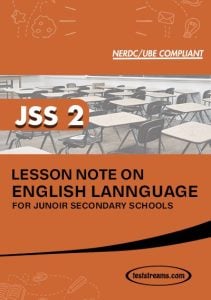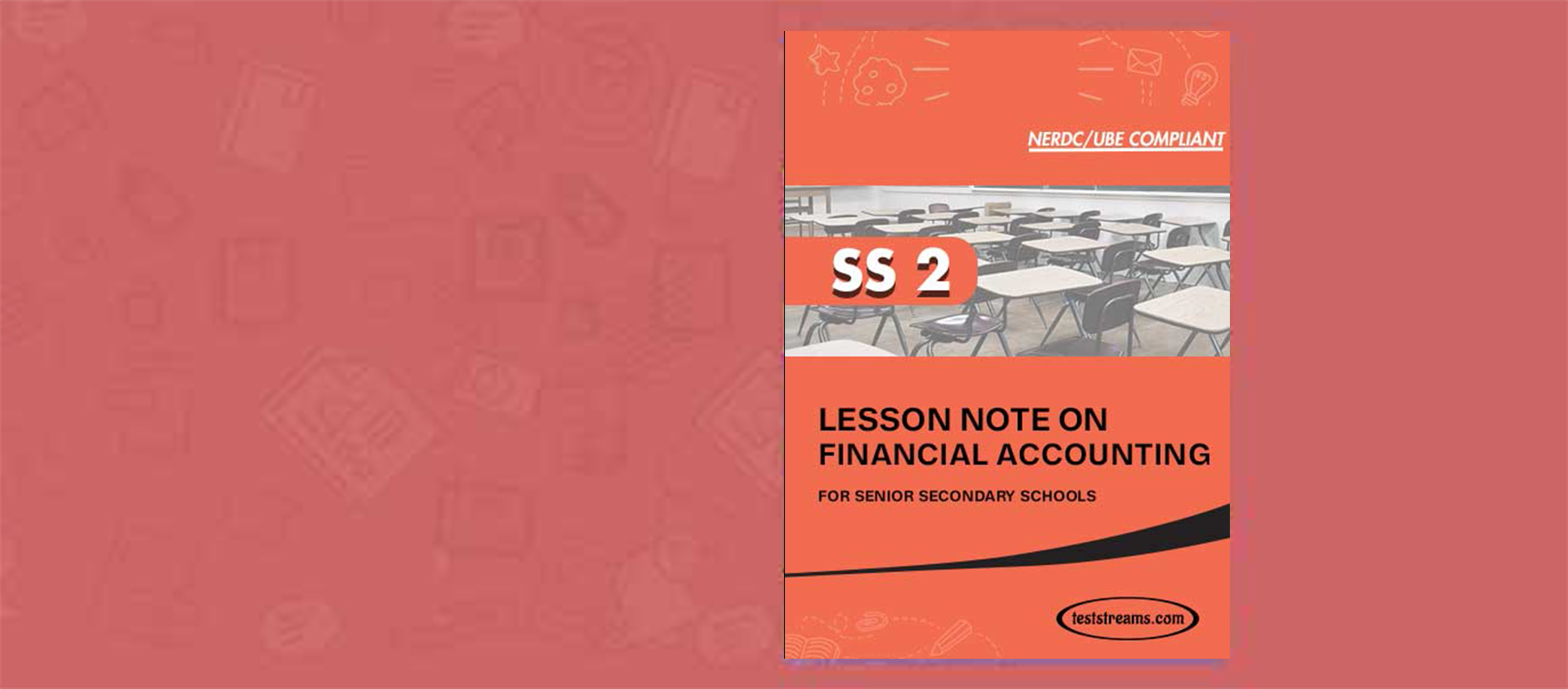Free ENGLISH Lesson Note JSS 2
This ENGLISH Lesson Note was pulled from our book (Lesson Note on ENGLISH for JSS2 MS-WORD); Compiled to serve as a reference material to help teachers draw out their lesson plan easier, saving you valuable time to focus on the core job of teaching.
The Lesson notes are based on the current NERDC curriculum (UBE compliant)
This ENGLISH Lesson Notes CoversThe Following Topics
VOWEL SOUNDS AND NOUNS (PART OF SPEECH)
LANGUAGE STRUCTURE AND FICTION VERSUS NON-FICTION
CONSONANTS (L, R, W, J) AND PART OF SPEECH:PRONOUN
LITERATURE: FICTION/NON-FICTION AND POETRY
GRAMMAR: VERBS AND WRITING SKILL: PARAGRAPHS
LANGUAGE STRUCTURE: REQUESTS AND LITERATURE: NON-VERBAL ASPECTS OF LANGUAGE
INTONATION, PASSIVE VOICE AND ADJECTIVE
LANGUAGE STRUCTURE & READING SKILLS: SURVEYING, SKIMMING AND SCANNING
SPOKEN ENGLISH: THE /I/ AND /I:/ SOUNDS AND ADVERBS
CONSONANT SOUNDS /S/ & /Z/ AND CONJUNCTION
QUESTION TAGS AND LITERATURE: POETRY
VOWELS SOUNDS (GENERAL REVIEW) AND PREPOSITIONS
COMPOSITION: ESSAY WRITING AND POETRY
CONSONANT CLUSTERS (REVISION) AND ADVERBIAL CLAUSES
INTERJECTIONS AND EXPRESSING CONTRAST
TYPES OF ESSAY AND AGREEMENT (CONCORD)
SOUNDS AND PAST PERFECT TENSE
TENSE 2
FIGURE OF SPEECH AND REPORTED SPEECH
HYPERBOLE
TERM: TENSES AND DETERMINERS
TERM: LETTER WRITING AND VERB TYPES
SPOKEN ENGLISH /Θ/ AND /Ð/ AND SKILL FOCUS PLANNING AN INTERVIEW
LETTER WRITING AND COMPARISON OF ADJECTIVES
LETTER WRITING 2
PUNCTUATION MARKS AND SUMMARY WRITING
SYNONYMS/ANTONYMS AND LITERATURE: DRAMA
Sample note
Contents:
Oral Skills: Vowel Sounds
Grammar: Nouns
Oral Skills: Vowel Sounds
The central vowel /ә/
This short sound is very common, It only occurs in unstressed syllables (ones said with almost no force). It is the vowel you normally hear in these common words: a, an, the, and, but, of. When you have to make this sound, your mouth should NOT be wide open.
Read the following words and phrases aloud. The unstressed syllables are shown in italics, and all contain /ә/:
| again | about | alone | away |
| Teacher | Mother | Tailor | Neighbour |
| an egg | the book | a glass of water | |
| at school | at home | Poor but happy |
Note that when the comes before another word beginning with a vowel, the sound is no longer /ә/ but /i/. Say the following:
He mixed the eggs together and poured them into the oil.
Vowel sounds present a considerable challenge to non-native speakers. Spoken English has an unusually high number of vowel sounds – from 5 written vowels (a, e, i, o, u) we produce 19 vowel sounds
Types of Vowel Sounds
A vowel sound is made by shaping the air as it leaves the mouth. There are four types of vowel in English:
-
-
- Short monothongs (2, 3, 4, 7, 10, 12 in the diagram)
- Long monothongs (1, 6, 8, 9, 11 in the diagram)
- Diphthongs (13 – 19 in the diagram)
- Weak vowels (1, 2, 5 , 9 in the diagram)
-
Grammar: Nouns
A Noun is a name of a person, animal, place or things.
There are four kinds of nouns:
- Common Nouns
- Proper Nouns
- Concrete Nouns
- Abstract Nouns
- Common Nouns
A common noun names a class of similar things (chair, box), and not an individual member of a specified group of people or things. We do not capitalize the first letter of a common noun unless it is the first word in a sentence.
Common nouns are names of people, things, animals and places, etc.
Examples:
- People – aunt, boy, butcher, carpenter, cousin, father, girl, lady, man, mother, tailor, woman
- Things – bicycle, book, car, computer, dress, hammer, key, pencil, ship, table, vase, wallet
- Animals – armadillo, baboon, bee, caterpillar, cow, dog, eagle, fish, monkey, pig, snake, turkey
- Places – airport, beach, bullring, cemetery, church, country, hospital, library, mall, park, restaurant, zoo
- Proper Nouns
A proper noun is a special name of a person, place, organization, etc. We spell a proper noun with a capital letter. Proper nouns also refer to times or to dates in the calendar.
We can use plurals for proper nouns in exceptional cases.
- There are three Johns in my class.
We can also use the, an, or a for a proper noun in special circumstances.
- This is no longer the London I used to live in.
Proper nouns are names of people, places, organization, etc.
Examples:
- People – Joke Thompson, Barack Obama
- Places – Jump Street, Museum of Modern Art, Sahara Desert
- Things – Financial Times, Eiffel Tower
- Organization – International Labour Organization, Red Cross, United Nations
- Animals – King Kong, Lassie
- Times and dates – Sunday, April
- Proper Nouns
One of the problem with proper nouns is to know whether or not you should use the (definite article) with them. Here are some guidelines:
Without THE –
- Names of people (with or without title) – Paul, Chief Mrs Busola, Dr Sunday, Bobola
- geographical features such as continents, countries, states, regions, cities, islands, mountains, lakes – Nigeria, Oregun, Everest, London
- Days of the week, months, festivals – Thursday, Easter, April
- Schools, colleges, universities – Government college Ketu, Universiy of Abuja
With THE –
- Groups of mountains or islands – the Himalayas
- Seas and Oceans – the Atlantic Ocean
- Descriptive titles – a) one in which only common nouns are used – the School of Agriculture. b) one that has a common noun preceding the particular name the University of Lagos
- Nouns: Concrete Noun
A concrete noun is something we see or touch. It is the opposite of an abstract noun. There are countable concrete nouns and uncountable concrete nouns
Countable and Uncountable
- Common nouns are either Countable or Uncountable. Can you remember the rules for using each type? (Countable, but not uncountable nouns, (i) can be used in the plural aswell as the singular, (ii) can be preceded by the indefinite article a(n). In the following list of common nouns, which ones are examples of which type?
road, wood, village, question, cupboard, electricity, newspaper, fuel, windscreen, box, blame, information, appointment.
- Uncountable nouns often name a substance or abstract quality which cannot easily be separated into different parts. If we want to speak of a part of it, we need to use a Unit word (which is itself countable), followed by of, followed by the uncountable noun. For example: a cup of water, ten litres of kerosene, a bit of luck, a flash of lightning. Note that cigarette is countable, not uncountable, so it is wrong to say He was smoking a stick of cigarette; just say He was smoking a cigarette.
Practice
Certain nouns are sometimes countable, sometimes uncountable; and there is some difference in meaning. For example, man when uncountable means human beings in general; when countable it means the male of the human species. Give a list of countable and uncountable nouns you know.
- Abstract Nouns
An abstract noun is a quality or something that we can only think of rather than as something that we can see or touch, e.g. beauty, courage, friendship, intelligence, truth. We can form abstract nouns from common nouns (child – childhood); from verbs (know – knowledge); and from adjectives (happy – happiness).
Collective Nouns
Collective Nouns are words to represent a group of people, animals, or things. A collective noun is a name used for a number of people, animals or things that we group together and speak of as a whole
Common collective nouns
- An army of ants
- A flock of birds
- A flock of sheep
- A herd of deer
- A gang of thieves
- A pack of thieves
- A panel of experts
- A forest of trees
- A galaxy of stars
- A pack of cards
Collective nouns are are nouns that in the singular refer to a collection of items: e.g. furniture, cutlery, equipment, alphabet, vocabulary e.t.c The first three of these should never be used in the plural.
The last two can be used in plural only if we are considering different languages. Use one of these words to fill the gaps below
- They have filled their new house with some very nice ____
- English and Arabic are languages that use different ____
- We cannot eat our food because we have no ____
- Our company’s biggest problem is out of date ____
- The English ____contains 26 letters
A collective noun can take a singular or a plural verb.
The following nouns can be singular or plural. Viewed as a single unit, the noun takes a singular verb; regarded as a group of separate members or parts, it becomes a plural noun used with a plural verb.
Examples:
- The new government has helped my community.
- The Government are determined to keep inflation in check.
A collective noun treated as singular uses a singular possessive pronoun; a plural collective noun takes a plural possessive pronoun.
Examples:
- Our team has won its first trophy. (The singular possessive pronoun isits. The singular possessive pronoun its agrees with the singular collective noun team.)
- Our team are deciding on the strategy for their next game. (Plural possessive pronoun: their)
Nouns: Singular and Plural
More words belong to the noun class than to any other class. This is because they are the names of people or things in our world.
- Nouns are either Proper (the names of particular people or things) or Common (the general names of people or things). In the following list of nouns, which belong to each group?
James, mind, leaves, Okri, engine, Benue
Proper nouns are easy to identify because they begin with a capital letter.
- Nouns have different Singular and Plural forms. Usually, -s or -as is added for the plural, but there are some irregular forms. In the following exercise, fill the gaps by giving the plural form of the nouns in brackets:
- The _____ (child) carried their ____ (plate) to the _____ (table)
- ____ (Woman) generally have smaller ____ (foot) than ____ (man)
- ____ (Goose) resemble ____ (duck) in appearance, but are bigger
- Many _____ (criterion) can be used to define success in life
- Some nouns are plural only e.g. trousers, scissors, barracks, cattle. Some have the same form for both singular and plural, e.g. species, series. Quarter usually means ‘one-fourth’, but quarter means ‘living area’. People can be singular or plural meaning ‘ethnic group’, ‘nation’, but in the plural it can also mean ‘persons’. Funds just means ‘money’, but fund means ‘money set aside for a special purpose’.
There are nouns that are always plural and take a plural verb:
Jeans, knickers, pants, pajamas, shorts, tights, trousers, and underpants
Pincers, pliers, scissors, shears, tongs
Clogs, sandals, slippers, and sneakers
Glasses (spectacles), binoculars
Examples:
- These trousers are not mine.
- Pliers are a handy tool.
- My garden shears trim the hedge very well.
- My glasses are used only for reading.
“A pair of” can be used with the above plural nouns and take a singular verb.
- This pair of purple trousers does not match your yellow jacket.
- These knives do not cut well. A new pair of stainless steel scissors is what I need.
Other nouns that are always plural:
- Clothes: My clothes need to be washed but I don’t have the time.
- Earnings: Earnings in the agricultural sector have increased by 5% in the fourth quarter.
- Cattle: Cattle are reared for their meat or milk.
- Police: Police are charging him with the murder of the princess.
- People: People in general are not very approachable. (Peoples when used in the plural (i.e. with ‘–s’) refers to peoples from more than one race or nation, e.g. the peoples of Asia)
- Football team: Liverpool are a very successful football team. (But Liverpool is a great city.)
Nouns which are plural in form but take a singular verb
The following plural nouns are used with a singular verb as they are treated as singular:
Athletics, economics, gymnastics, linguistics, mathematics, mechanics, news, numismatics, measles, mumps, physics, politics and pyrotechnics
- Economics: Economics was my favourite subject at school.
- News – The good news is that we have all been invited.
- Diseases such as mumps, measles, etc: An infectious illness, mumps was common among children.
Measurements and amounts that are considered as a single unit:
- One hundred years is a century.
- Ten kilometers is a long distance.
- Twenty dollars is not enough to buy a good shirt.
- Seven days in prison is all he got for shoplifting.
Skill Focus – Students’ Problems with School work
Students often complain about problems with school work. For example, look at the three problems Ali, Olu and Ada have below. Do you have any of these problems too?
Ali
Some books aren’t so easy to read, and I find it quite hard to understand some of them.
Olu
I find there’s too much reading to do. I can’t keep up with it all.
Ada
I find that it’s quite difficult to remember what we have read.
Maybe we have all of these problems to some extent! Let’s look to each in turn:
Ali’s problem: Understanding
Many people confuse understanding a passage with understanding all the words in a passage. This is not always necessary. You can often understand the most important points without understanding every single word.
What should you do if you come across a new word, and you aren’t sure what it means? Here are five tips:
- try to infer the meaning of the word from the way it is used
- then without wasting any more time, carry on reading. The word’s meaning may become clear as you read on
- if necessary, come back to it later
- if you think that the word is unimportant, ignore it
- if you think it is important, jot it down on a piece of paper, and look it up later.
For example, look at the word ‘infer’ underlined above. Does this sentence mean
- you should ignore strange words?
- you should look them up in a dictionary at once?
- you should try to guess the meaning?
This brings us at one more important point: get into the habit of talking about your studies with your friends. You will be surprised how talking about your work helps to increase your understanding of it!
Olu’s Problem: Time
If you are short of time for reading and studying, there may be two answers:
- Maybe you are not spending your study time efficiently – see below
- Maybe you have not organized your life to make time for important things like studying, relaxing, meeting you friends, and so on.
You need to keep a balance between the different important activities in your life. Spending too much time on any one thing, and not enough on others, is not good for anyone. To make sure you have a good balanced approach in life, you will find it helps to draw up a personal time table.
Ada’s Problem: Remembering
Good ways of remembering what we study include:
- Reading actively.
- Don’t just try to memories information – understand and think about it. Identify important information, and underline it in pencil. Make short notes of the most important points in a reading text.
- Talking about your studies: Explaining something you have learnt to someone who does not know about it can be a big help. As you explain it, you have to order your thoughts, and you arrive at new insights yourself too.
- Revising: Once you have made notes, that is not the end of the matter, however. It is important to read them through from time to time – and not only just before an examination. It pays to refresh your memory several times.
- Make sure that if you copy someone else’s writing, you can read it.
Making notes
Make short notes on this Skills focus box. If you like, begin as follows:
How to study
- Understanding:
Assessment
- How many types of vowels are there in English language?———-
(A. Three B. Two C. Five D. Four) - Mention and explain the types of vowels that you know.
- List and explain the four types of nouns that you know.
- Explain the major difference between singular and plural nouns.

Get the complete Lesson Note with more content at very affordable price.Lesson Note on ENGLISH for JSS2 MS-WORD- PDF
![]()



